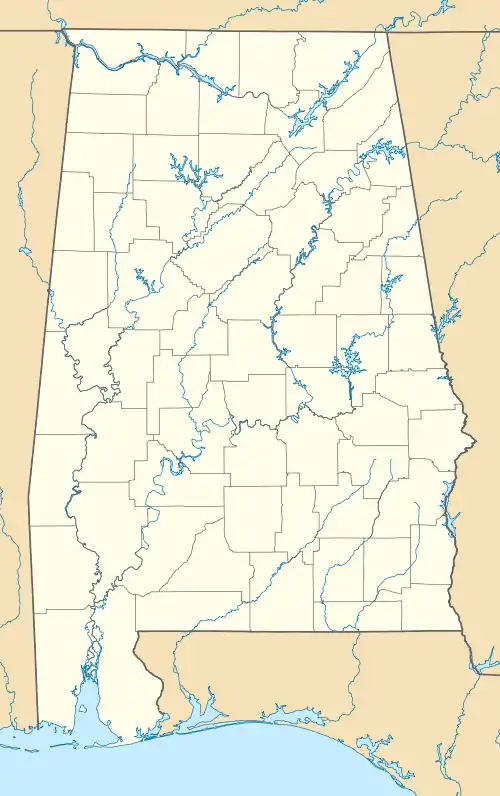Dexter Avenue Baptist Church | |
 Dexter Avenue Baptist Church, 2000 | |
   | |
| Location | 454 Dexter Avenue Montgomery, Alabama |
|---|---|
| Coordinates | 32°22′38.26″N 86°18′10″W / 32.3772944°N 86.30278°W |
| Built | 1883–89 |
| Architectural style | Late Victorian |
| NRHP reference No. | 74000431 |
| Significant dates | |
| Added to NRHP | July 1, 1974[1] |
| Designated NHL | May 30, 1974[2] |
Dexter Avenue Baptist Church is a Baptist church in Montgomery, Alabama, United States, affiliated with the Progressive National Baptist Convention. The church was designated as a National Historic Landmark in 1974 because of its importance in the civil rights movement and American history.[2][3] In 1978 the official name was changed to the Dexter Avenue King Memorial Baptist Church, in memory of Dr. Martin Luther King Jr., who was pastor there and helped organize the Montgomery bus boycott in 1955 during the civil rights era. The church is located steps away from the Alabama State Capitol.
On January 1, 2008, the US Government submitted the church to UNESCO as part of an envisaged future World Heritage Site nomination, because of this important history. It is on the UNESCO "Tentative List of World Heritage Sites".[4]
History
The Dexter Avenue Baptist Church congregation was organized in 1877 by freedmen and free people of color. It was first known as the Second Colored Baptist Church. The church trustees paid $270 on January 30, 1879, for a lot at the corner of what is now Dexter Avenue and Decatur Street. The first church building was a small wood-frame building. The congregation began construction of a new building in 1883; the brick building was not completed until 1889. The church began serving the broader African American community on October 3, 1887, when it hosted the first registration of students for Alabama State University, a historically black college.[5]
In 1899, William H. McAlpine became pastor; he was a cofounder of Selma University. Vernon Johns, an early leader of the Civil Rights Movement, served as pastor from 1947 to 1952. He was succeeded by Dr. Martin Luther King Jr., who was pastor of the church from 1954 to 1960. He organized the 1955 Montgomery bus boycott from his basement office.[3]
Near the church is the former Dexter Parsonage, which served as home to twelve pastors of the church between 1920 and 1992. It is now operated as the Dexter Parsonage Museum, interpreting church history. The church was added, on its own merits, to the National Register of Historic Places in 1982.[5]
Gallery
.jpg.webp) Exterior
Exterior Interior
Interior.jpg.webp) Dexter Avenue King Memorial Legacy Center
Dexter Avenue King Memorial Legacy Center Dexter Parsonage Museum
Dexter Parsonage Museum
See also
References
- ↑ "National Register Information System". National Register of Historic Places. National Park Service. January 23, 2007.
- 1 2 "Dexter Avenue Baptist Church". National Historic Landmark summary listing. National Park Service. September 18, 2007. Archived from the original on January 11, 2008.
- 1 2 Marcia M. Greenlee (July 1973). "National Register of Historic Places Inventory-Nomination: Dexter Avenue Baptist Church". National Park Service.
{{cite journal}}: Cite journal requires|journal=(help) and Accompanying 2 photos, exterior, from 1973 (1.29 MB) - ↑ UNESCO World Heritage Convention, Tentative Lists, Civil Rights Movement Sites, https://whc.unesco.org/en/tentativelists/5241/ (Referenced 6 Dec 2016)
- 1 2 "History". Dexter Avenue King Memorial Baptist Church & Parsonage. December 24, 2008.
External links
 Media related to Dexter Avenue Baptist Church at Wikimedia Commons
Media related to Dexter Avenue Baptist Church at Wikimedia Commons- Dexter Avenue King Memorial Baptist Church